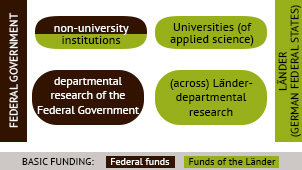We use cookies to enable you to make the best possible use of our website. Only cookies that are necessary for the operation of the site are set. Details in our privacy policy.
German agricultural research at a glance

The Federal Government and the Länder fund research institutions.
The German research landscape is structured and funded in a diverse way. Among the most important research institutes in Germany are numerous university departments as well as the non-university institutions of Fraunhofer-Gesellschaft, Helmholtz Association, Leibniz Association and Max Planck Institute. The non-university institutions are funded by the German federal budget and the Länder governments to varying extents.
Here you will find an overview of the Max Planck Institutes, the Fraunhofer Institutes, the Institutes of the Leibniz Association and the institutes of the Helmholtz Association, which are represented with projects in FISA.
Apart from these institutions and their research activities there are the research and developmental activities of the federal and state departments, the so called departmental research (Ressortforschung).
Departmental research is accomplished by scientific authorities subordinated to a ministry as well as by means of awarding research contracts, for example to universities or research institutes such as Leibniz Association or Fraunhofer-Gesellschaft. Departmental research serves as a bridge between science, society and politics. Its main task is to offer scientific advice to the ministries.
The more than 40 research institutions of the Federation Government of Germany are presented in a map (in German).
Research insitutions of the Federal Ministry of Food and Agriculture
Four federal research institutes, the Federal Institute for Risk Assessment, the Federal Agency for Consumer Protection and Food Safety, and the German Biomass Research Center, are part of the research project at the German Agrarian Ministry.
The four federal research institutes are the Julius Kühn Institute (JKI), Friedrich-Loeffler Institute (FLI), Max Rubner Institute (MRI) and Thünen Institute (TI); they draw up scientific decision aids for the BMEL in the fields of food, agricultural, forestry, fisheries and consumer policy. They broaden the state of the art in their fields for the common good. The Federal Institute for Risk Assessment (BfR) also conducts research into health-related consumer protection.
The ministry is also supported by six Leibniz institutes, which conduct applied research and complement the technical spectrum of the above research institutions. These institutions from the Gottfried Wilhelm Leibniz Scientific Association (WGL) are supported by the BMEL; their scientific findings are used for the ministry's consultation requirements.
The Leibnitz Institutes are:
- Leibniz Institute of Agricultural Development in Transition Economies
- Leibniz Centre for Agricultural Landscape Research
- Leibniz Institute for Agricultural Engineering and Bioeconomy
- Leibniz Institute of Vegetable and Ornamental Crops
- German Research Centre for Food Chemistry
- Leibniz Institute for Farm Animal Biology